The music for this podcast was generously provided by Dr. Stefan Hagel.
Cover illustration and voice of Ovid provided by Lu (twitter: @DRScomics, instagram: @dead_romans_society, tumblr: @ovidiana).
Foley sounds for soundscape provided by zapsplat.com.
Hosting, English sections, and editing provided by Margrethe.
Transcript:
Mar: Salve aveque. This is Margrethe from Ovid Daily, for our podcast special: “Evenings with Ovid”. Joining me today from the far-off shores of the Black Sea is the eminent Latin poet Publius Ovidius Naso, (given voice by the excellent Lu), here to continue one of his most moving works: Tristia. Last week, we heard Carmina Secunda, which found you sea-tossed, gods-damned and distressed on your exile voyage. But the sea let you live to see another day. Cheating death is always exciting! Are you ready to share the next installment?
Lu/Ovid: Non sine dolore. Hoc non siccis genis audietis. Flebilis ut fortuna mea est, ita flebile carmen.
Lu/Ovid:
Cum subit illius tristissima noctis imago,
qua mihi supremum tempus in urbe fuit,
cum repeto noctem, qua tot mihi cara reliqui,
labitur ex oculis nunc quoque gutta meis.
Iam prope lux aderat, qua me discedere Caesar
finibus extremae iusserat Ausoniae.
Nec spatium nec mens fuerat satis apta parandi:
torpuerant longa pectora nostra mora.
Non mihi servorum, comites non cura legendi,
non aptae profugo vestis opisve fuit.
Non aliter stupui, quam qui Iovis ignibus ictus
vivit et est vitae nescius ipse suae.
ut tamen hanc animi nubem dolor ipse removit,
et tandem sensus convaluere mei,
alloquor extremum maestos abiturus amicos,
qui modo de multis unus et alter erat.
uxor amans flentem flens acrius ipsa tenebat,
imbre per indignas usque cadente genas.
Nata procul Libycis aberat diversa sub oris,
nec poterat fati certior esse mei.
Quocumque aspiceres, luctus gemitusque sonabant,
formaque non taciti funeris intus erat.
Femina virque meo, pueri quoque funere maerent,
inque domo lacrimas angulus omnis habet.
Si licet exemplis in parvis grandibus uti,
haec facies Troiae, cum caperetur, erat.
Iamque quiescebant voces hominumque canumque,
Lunaque nocturnos alta regebat equos.
Hanc ego suspiciens et ad hanc Capitolia cernens,
quae nostro frustra iuncta fuere Lari,
“numina vicinis habitantia sedibus,” inquam,
“iamque oculis numquam templa videnda meis,
dique relinquendi, quos urbs habet alta Quirini,
este salutati tempus in omne mihi.
Et quamquam sero clipeum post vulnera sumo,
attamen hanc odiis exonerate fugam,
caelestique viro, quis me deceperit error,
dicite, pro culpa ne scelus esse putet.
ut quod vos scitis, poenae quoque sentiat auctor:
placato possum non miser esse deo.”
Hac prece adoravi superos ego: pluribus uxor,
singultu medios impediente sonos.
Illa etiam ante lares passis prostrata capillis
contigit extinctos ore tremente focos,
multaque in adversos effudit verba Penates
pro deplorato non valitura viro.
Iamque morae spatium nox praecipitata negabat,
versaque ab axe suo Parrhasis Arctos erat.
Quid facerem? Blando patriae retinebar amore:
ultima sed iussae nox erat illa fugae.
A! Quotiens aliquo dixi properante “quid urges?
vel quo festinas ire, vel unde, vide.”
A! Quotiens certam me sum mentitus habere
horam, propositae quae foret apta viae.
Ter limen tetigi, ter sum revocatus, et ipse
indulgens animo pes mihi tardus erat.
Saepe “vale” dicto rursus sum multa locutus,
et quasi discedens oscula summa dedi.
Saepe eadem mandata dedi meque ipse fefelli,
respiciens oculis pignora cara meis.
Denique “quid propero? Scythia est, quo mittimur,” inquam,
“Roma relinquenda est. utraque iusta mora est.
uxor in aeternum vivo mihi viva negatur,
et domus et fidae dulcia membra domus,
quosque ego dilexi fraterno more sodales,
o mihi Thesea pectora iuncta fide!
Dum licet, amplectar: numquam fortasse licebit
amplius. In lucro est quae datur hora mihi.”
Nec mora, sermonis verba inperfecta relinquo.
Complectens animo proxima quaeque meo.
Dum loquor et flemus, caelo nitidissimus alto,
stella gravis nobis, Lucifer ortus erat.
Dividor haud aliter, quam si mea membra relinquam,
et pars abrumpi corpore visa suo est.
Sic doluit Mettus tunc cum in contraria versos
ultores habuit proditionis equos.
Tum vero exoritur clamor gemitusque meorum,
et feriunt maestae pectora nuda manus.
Tum vero coniunx umeris abeuntis inhaerens
miscuit haec lacrimis tristia verba meis:
“non potes avelli. Simul hinc, simul ibimus:” inquit,
“te sequar et coniunx exulis exul ero.
Et mihi facta via est, et me capit ultima tellus:
accedam profugae sarcina parva rati.
Te iubet e patria discedere Caesaris ira,
me pietas. Pietas haec mihi Caesar erit.”
Talia temptabat, sicut temptaverat ante,
vixque dedit victas utilitate manus.
Egredior, sive illud erat sine funere ferri,
squalidus inmissis hirta per ora comis.
Illa dolore amens tenebris narratur obortis
semianimis media procubuisse domo:
utque resurrexit foedatis pulvere turpi
crinibus et gelida membra levavit humo,
se modo, desertos modo complorasse Penates,
nomen et erepti saepe vocasse viri,
nec gemuisse minus, quam si nataeque virique
vidisset structos corpus habere rogos;
et volvisse mori, moriendo ponere sensus,
respectuque tamen non periisse mei.
Vivat, et absentem, quoniam sic fata tulerunt,
vivat ut auxilio sublevet usque suo.
Mar: Gratias tibi ago, Ovidi. I have here the English translation of our guest’s poem, originally translated by A.L. Wheeler in 1924.
“When steals upon me the gloomy memory of that night which marked my latest hours in the city—when I recall that night on which I left so many things dear to me, even now from my eyes the teardrops fall.
“Already the morning was close at hand on which Caesar had bidden me to depart from Ausonia's furthest bounds. No time had there been or spirit to get ready what might suit best; my heart had become numb with the long delay. I took no thought to select my slaves or my companions or the clothing and outfit suited to an exile. I was as dazed as one who, smitten by the fire of Jove, still lives and knows not that he lives. But when my very pain drove away the cloud upon my mind and at length my senses revived, I addressed for the last time as I was about to depart my sorrowing friends of whom, just now so many, but one or two remained. My loving wife was in my arms as I wept, herself weeping more bitterly, tears raining constantly over her innocent cheeks. My daughter was far separated from us on the shores of Libya, and we could not inform her of my fate. Wherever you had looked was the sound of mourning and lamentation, and within the house was the semblance of a funeral with its loud outcries. Men and women, children too, grieved at this funeral of mine; in my home every corner had its tears. If one may use in a lowly case a lofty example, such was the appearance of Troy in the hour of her capture.
“Now the voices of men and dogs were hushed and the moon aloft was guiding her steeds through the night. Gazing up at her, and by her light at the Capitol, which, all in vain, adjoined my home, I prayed: ‘Ye deities that dwell near by and ye temples never henceforth to be seen by my eyes, ye gods of this lofty city of Quirinus, whom I must leave, receive from me this my salutation for all time! And although too late I take up the shield when wounded, yet disburden of hatreds this banishment of mine; tell to that man divine what error beguiled me, that he may not think a fault to be a crime and that what you know he too, the author of my punishment, may feel. If the god be appeased I cannot be wretched.’
“With such prayer as this I appealed to the gods, my wife with many more, the sobs interrupting her cries half uttered. She even cast herself with flowing hair before the Lares, touching the cold hearth with quivering lips and pouring forth to the Penates before her many words not destined to avail the spouse she mourned.
“Now night hurrying to her close refused me time for lingering, and the Parrhasian bear had wheeled about her axis. What was I to do? The enthralling love of country held me, yet that was the last night before the exile that had been decreed. Alas! how many times did I say, as somebody hastened by, ‘Why do you hurry me? Consider whither you are hastening or whence!’ Alas! how many times did I falsely say that I had a definite hour suited to my intended journey. Thrice I touched the threshold, thrice did something call me back, and my very feet moved slowly to gratify my inclination. Oft when I had said farewell once again I uttered many words, and as if I were in the act of setting forth I gave the final kisses. Oft I gave the same parting directions, thus beguiling myself, with backward look at the objects of my love. At last I said, ‘Why hasten? ’Tis Scythia whither I am going, 'tis Rome that I must leave. Both are good reasons for delay. My wife lives and I live, but she is being denied me forever and my home and the sweet inmates of that faithful home, and the comrades I have loved with a brother's love, O hearts knit to me with Theseus' faith! Whilst I may I will embrace you. Never more perhaps shall I have the chance. The hour granted me is so much gain.’
“No longer delaying I left my words unfinished and embraced each object dearest to my heart. During my talk and our weeping, bright in the lofty sky Lucifer had arisen, to me a baneful star. I was torn asunder as if I were leaving my limbs behind—a very half seemed broken from the body to which it belonged. Such was the anguish of Mettus when the steeds were driven apart, punishing his treachery. Then in truth arose the cries and laments of my people; sorrowing hands beat upon naked breasts. Then in truth my wife, as she hung upon my breast at parting, mingled these sad words with my tears, ‘I cannot suffer you to be torn away. Together, together we will go; I will follow you and be an exile's exiled wife. For me too the journey has been commanded, for me too there is room in the faraway land. My entrance will add but a small freight to your exile ship. You are commanded to flee your country by Caesar’s wrath, I by my loyal love. This love shall be for me a Caesar.’
“Such was her attempt, as it had been before, and with difficulty did she surrender her resolve for my profit. I set forth—if it was not rather being carried forth to burial without a funeral—unkempt, my hair falling over my unshaven cheeks. She, frenzied by grief, was overcome, they say, by a cloud of darkness, and fell half dead in the midst of our home. And when she rose, her tresses fouled with unsightly dust, raising her body from the cold ground, she lamented now her deserted self, now the deserted Penates, and often called the name of her ravished husband, groaning as if she had seen the bodies of her daughter and myself resting on the high-built pyre; she wished to die, in death to lay aside all feeling, yet from regard for me she did not die. May she live! and when I am far away since thus the fates have willed so live as by her aid to bring constant relief.”
Mar: Thank you so much for listening, and be sure to tune into Ovid Daily’s “Evenings with Ovid” next week for the next installment of Ovid’s Tristia. Vale beneque placideque quiescas!
Mar: A transcript for this podcast is available at oviddaily.substack.com. Our text comes from the 1924 Loeb Classical Library edition of the Tristia, edited and translated by A.L. Wheeler. Our music is performed by Dr. Stefan Hagel on the Hellenistic Aulos, a link to which is available in the description, and on our website on our “Resources” page. Foley sounds for our soundscape are provided by zapsplat.com. Our lovely cover art was illustrated by Lu, and you can see more of Lu’s art on Twitter @DRScomic, or on Tumblr @ovidiana. If you wish to contact Ovid Daily, you may email me at oviddaily@substack.com.

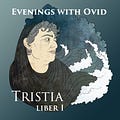



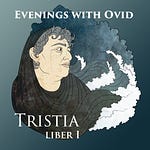
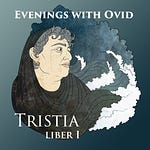

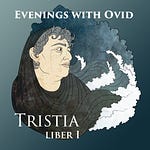
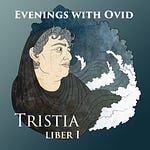

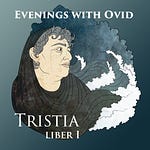
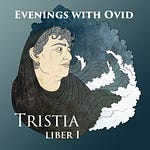
Tristia 1.3